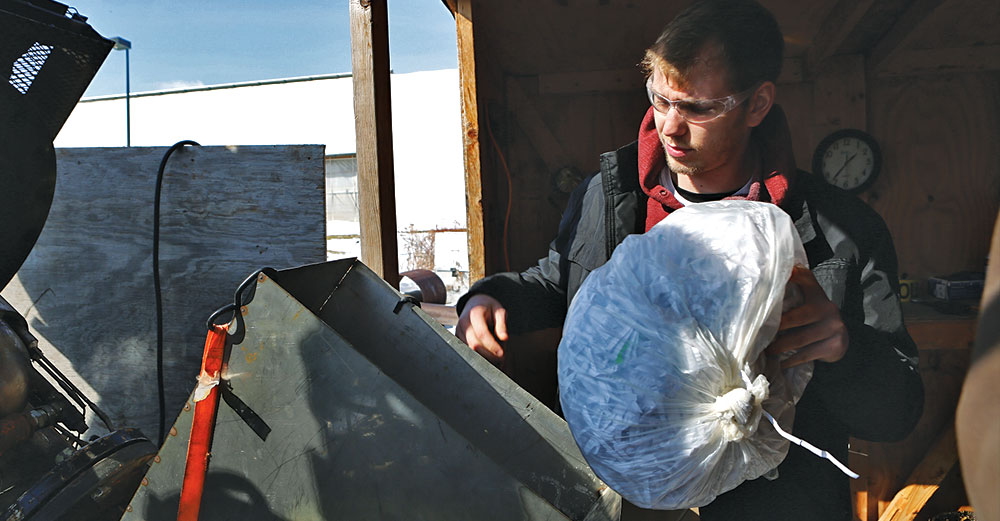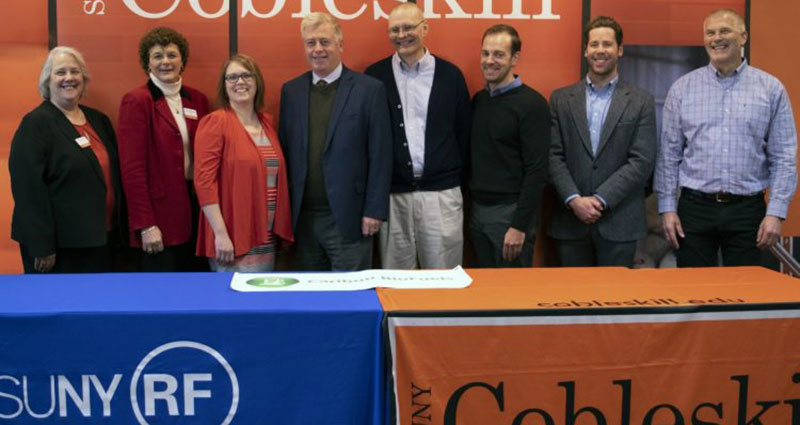
In order to continue to power all our gadgets, tools, vehicles, homes, and more, and to make an impact on climate change, we need to find sources of sustainable energy that can power our lives. Creative and scientific minds are finding a source for this clean energy in biomass, or organic material that contains stored energy from the sun. When biomass is burned, the energy is released. Now SUNY minds are finding new ways to make it available for use.
Caribou Biofuels, Incorporated, a company that develops hardware and systems to cost-effectively process biomass, has entered into an agreement with the Research Foundation for SUNY, on behalf of SUNY Cobleskill, to develop and commercialize a rotary gasifier that turns combustible waste into biofuel and a soil supplement.
The patent-pending technology was invented at SUNY Cobleskill by Professor David Waage. The initial research was funded by a joint Environmental Protection Agency (EPA) and Department of Defense (DOD) program. In 2019, SUNY Cobleskill received a $1.6 million grant from the two agencies to build and demonstrate a fully automated, portable rotary gasifier waste-to-energy system at a domestic military base. A key advantage of Waage’s technology is that it is mobile and can be deployed at the site of the biomass.
Thanks to a series of technical innovations, this gasifier is cleaner, more efficient, and more convenient than its predecessors. From almost any combustible material it produces both gaseous and liquid fuels that are significantly higher energy content than other similar gasification technologies. The fuels burn markedly cleaner than fossil fuels, while reducing overall carbon emissions. The machine built at SUNY Cobleskill can produce 60 kilowatts of power a day from approximately two tons of feedstock, enough to power about 50 standard American homes.
There is tremendous potential for the gasifier in domestic and community use. In California, for example, larger and more frequent wildfires point to the need to clear forests of dead trees and undergrowth. The state’s large agriculture sector is also seeking a low-emission alternative to direct burning agricultural biomass. An environmentally friendly system that converts woody biomass into marketable products would be an ideal solution to both problems.
“The invention and development of the rotary gasifier encapsulates SUNY Cobleskill’s mission to grow, to sustain and to renew our world and its citizens,” said SUNY Cobleskill President Marion A. Terenzio. “We are proud of Professor David Waage for imagining the possibilities of a cleaner, more sustainable world, and taking action, right here on our campus, to develop this advanced technology with enormous potential. We extend our gratitude to SUNY Research Foundation for shepherding the project, and welcome our new partner, Caribou Biofuels. This is a great day for all concerned.”
Caribou Biofuels, Inc. brings together the strengths of four partnering organizations — SUNY Cobleskill (gasifier technology), Lawrence Berkeley National Laboratory (ultra clean emissions technology), Scaled Power (turbine-generators), and the Joint Bioenergy Institute (biofuels markets) — to develop a clean emission mobile biomass processing system. Caribou CEO Kieran Mitchell and Chief Technology Officer Blake Simmons are leading a collaborative effort to solve California’s fire and forest management problem.
Research at SUNY produces nearly 300 new technologies a year. The Research Foundation for SUNY protects the valuable intellectual property generated at SUNY campuses and works with industry and businesses, like Caribou Biofuels to translate research discoveries into commercial products that benefit society and spur economic development.




